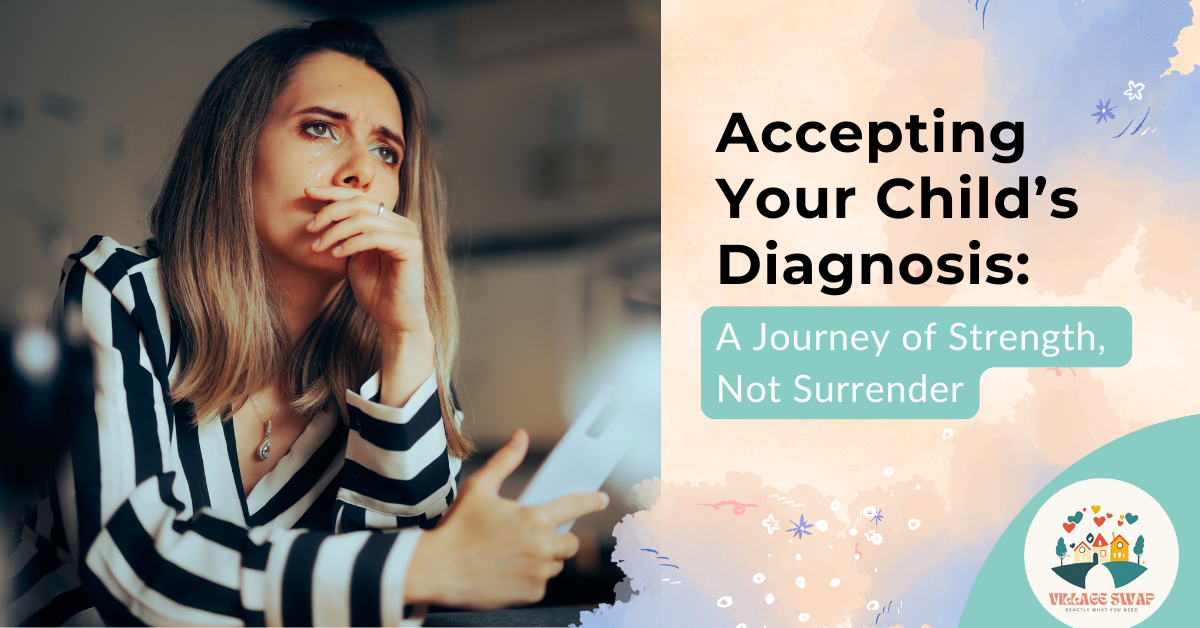Accepting Your Child’s Diagnosis

Accepting Your Child’s Diagnosis
When the Diagnosis Lands: How to Breathe, Feel and Keep Moving Forward
You remember the moment clear as day. The doctor’s words hit like a truck—sudden, heavy, leaving you winded. The room didn’t just fall silent; it changed. Your plans, your vision, your child’s future—all suddenly hanging in mid-air, waiting for you to catch your breath.
A diagnosis for your child? It’s not just a label—it’s a whole new landscape. One you never signed up to explore. It’s the slow, quiet unravel of the dreams you’d been sketching since those first flutters in your belly. But love, this is where your grit kicks in.
You’ve wrestled toddlers out of Woolies mid-meltdown, navigated sleepless nights like a seasoned pirate in a storm, and managed to keep some kind of routine running while the laundry pile grew sentient. You? You were built for resilience. And this next chapter, though tough, will show you just how strong you already are.
The Emotional Earthquake
Let’s not sugar-coat it—getting a diagnosis can feel like emotional whiplash. One minute you're fine, the next you're sobbing in the car park, wondering what the hell just happened. Shock, grief, anger, guilt—it’s all part of the terrain. And here's the truth: there is no right way to feel.
Psychologists often talk about the "Adjustment Curve"—which, let’s be honest, feels a lot like the emotional equivalent of a rollercoaster in a cyclone.
-
Denial – Maybe they’ve got it wrong?
-
Anger – Why us? Why my child?
-
Bargaining – If I find the right therapy, maybe this will just... disappear?
-
Sadness – This wasn’t the life I pictured for them.
-
Acceptance – Okay. This is ours. Let’s make it work.
But here’s the kicker: it’s not linear. Some days you’ll feel like Supermum. Others, you’ll be eating ice cream out of the tub while googling “miracle cures”. And that’s okay. You’re not back at square one—you’re just being human.
The Ablett Family: Strength in the Spotlight
Take Gary Ablett Jr. and his wife Jordan. AFL royalty, yes—but also parents walking a very human path. When their son Levi was diagnosed with a rare degenerative condition, the grief was real. But so was the love. Jordan speaks openly about the highs and the heartbreaks, the lessons Levi teaches them daily, and the joy in celebrating the small stuff.
Their story? It’s not one of defeat. It’s a love letter to resilience. A reminder that acceptance doesn’t mean giving up—it means digging deep, showing up, and loving fiercely.
Acceptance Isn’t Surrender—It’s Strategy
Let’s break down Acceptance and Commitment Therapy (ACT)—a no-BS psychological approach that helps you stop wrestling with your emotions and start walking forward. It’s not about pretending everything’s fine. It’s about making peace with the chaos and choosing to act anyway.
Here’s the ACT toolbox, parent edition:
Cognitive Defusion – You are not your thoughts. Instead of “I can’t do this,” try “I’m having the thought that I can’t do this.” See the difference? It’s subtle, but it gives you space to breathe.
Acceptance – Don’t fight the feelings. Let them in, give them a cuppa, and know they’ll eventually leave. Resistance makes them louder.
Mindfulness – Stop time-travelling to future fears. Come back to now. To your child’s giggle, the sparkle in their eyes, the way they say your name like it’s magic.
Clarify Your Values – What matters most to you? Being present? Raising a kind human? Let that guide your decisions—not the fear.
Take Committed Action – Start small. One phone call. One support group. One bedtime story where you both laugh so hard you forget the hard stuff for a moment. That’s progress.
Helping Your Child Find Their Shine
Now here’s the big shift—this journey isn’t just yours. You’re also the compass for your child. You’re their translator, their champion, their soft place to land.
Keep It Simple, Keep It Honest – If they’re old enough, tell them what’s going on. Not in scary medical speak, but in words that empower:
"Your brain works in its own cool way, and we’re going to learn how to make that your superpower."
Highlight the Gold – Every child has gifts. Maybe it’s memory. Maybe it’s empathy. Maybe it’s the way they line up their Hot Wheels cars in perfect rainbow order. Celebrate the strengths as much as the struggles.
Stories Matter – Show them role models. Kids like them, grown-ups like them—people who’ve not just “gotten by” but flourished. Whether it’s Temple Grandin, Richard Branson, or someone from your own community, they need to see what’s possible.
Find Your Village – And this is where we come in. Village Swap was built for exactly this. For the chats that happen between tears and breakthroughs. For the swaps that aren’t just clothes or toys, but wisdom, courage, and support. You don’t need to do this alone.
Final Word, From One Parent to Another
This road? It wasn’t on your map. But that doesn’t mean it’s the wrong one. It’s just different. Windier. A few more potholes. But also filled with views you never expected—moments of raw connection, wild pride, and fierce, unshakable love.
You’ve got this. And we’ve got you.
— The Village Swap Team
Resources for Australian Parents
Raising Children Network – Goldmine of research-backed parenting guides. (Raising Children)
Autism Awareness Australia – A must-read if you’re navigating an autism diagnosis. (Autism Awareness)
Parenting SA – Simple, practical guides for parents. (Parenting SA)
Carers Australia – Support services for families caring for children with additional needs. (Carers Australia)
